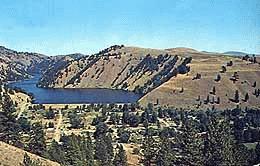On the night of January 4, 1891, an armed mob hangs a 15-year-old Indian youth, Stephen, near Conconully. Stephen was being held in the Okanogan County jail as a material witness to the murder of freighter Samuel Smith Cole three months before. The act will spark tremendous resentment among Native Americans on the Colville Indian Reservation and almost hysterical rumors of an Indian uprising, but no other violence will occur.
In early October 1890, Samuel Smith Cole, Salmon Creek farmer and freight wagon owner, loaded goods at the Washington Central Railroad at Coulee City and headed to Francis Jackson "Pard" Cummings's store in Alma, in Okanogan County. A few days later, his wagon, missing three of four mules, was found at Cold Springs (later Cole Springs) on the Colville Reservation and Cole was nowhere to be found. His badly decomposed body was discovered two months later three-fourths of a mile away (his skull with a bullet hole in the forehead was recovered nine years later).
Rumors of confessions by two Indians, Johnny, age 20, and Stephen, age about 15, led to warrants for their arrest. Deputy Sheriff Lee Ives (by day a Conconully butcher) went to a small village at the mouth of Chiliwhist Creek to arrest the suspects. Johnny was armed and in the confrontation, Ives killed Johnny and wounded a woman bystander. Stephen passed word that he would surrender and Justice of the Peace Richard M. Price found Stephen and took him to the chapel at St. Mary's mission on January 4, 1891. Price learned that Stephen and Johnny had witnessed the murder, but had not committed it.
Price took Stephen to Conconully where he was lodged in the jail as a witness, but without being charged with a crime. That night, about 20 armed men wearing masks, rode on horseback from Alma to Conconcully. They captured the jailer, who was asleep in a livery stable nearby. With the jailer's keys, they took Stephen from the jail and locked the jailer inside.
Convinced that Stephen had killed Cole, the mob took him to a Ponderosa pine grove a half-mile south and there hanged him. Local newspapers lauded the action and dismissed the victim as "only an Indian" (Wilson, 134).
Stephen's tribe responded with outrage and ritual dancing. The previous month, the U.S. Army had killed several hundred Dakota Indians in South Dakota at Wounded Knee Creek and whites in Okanogan County were convinced that they were on the verge of another massive uprising. In Ruby, citizens talked of barricading women and children in the shafts and tunnels of the Fourth of July Mine. Others left the area. Wild rumors abounded and one group of white residents fired on another group thinking they were the enemy.
The Ruby town council petitioned Olympia for help. Acting Governor Charles E. Loughton alerted Company G of the State Militia in Spokane and dispatched Adjutant General A. P. Curry and his staff to the scene. Curry brought along several hundred army rifles for distribution to the settlers, but most of these proved unserviceable.
Curry met with tribal leaders and dissuaded them from retaliation. But this was unnecessary since the Indians had no violent intentions. The turmoil died down. No one was ever identified or charged in connection with Stephen's murder.

